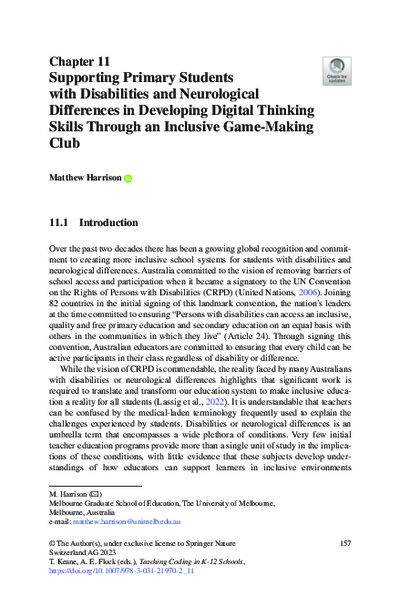Supporting Primary Students with Disabilities and Neurological Differences in Developing Digital Thinking Skills Through an Inclusive Game-Making ClubMatthew Harrison
|
 |
 Diese Seite wurde seit 1 Jahr inhaltlich nicht mehr aktualisiert.
Unter Umständen ist sie nicht mehr aktuell.
Diese Seite wurde seit 1 Jahr inhaltlich nicht mehr aktualisiert.
Unter Umständen ist sie nicht mehr aktuell.
 Zusammenfassungen
Zusammenfassungen
 Like many education systems around the world, Australian schools are working towards a better understanding of how to transition to a more inclusive system of schooling. As part of this philosophical shift, teachers are looking for new ways to support students living with disabilities and neurological differences. Strength and interest-based programs are seen by some educators and researchers as a particularly fruitful avenue for engaging and motivating learners. An example of harnessing the strengths and interests of many students with disabilities and differences is the use of game making. Through designing and coding digital games, students are provided with a culturally meaningful context for teaching the digital thinking skills that underpin coding. Digital thinking skills include design thinking, systems thinking and computational thinking. Collaboratively developing games also provides a rich context for developing collaborative social skills such as collective decision-making, negotiating and perspective taking. To highlight the power of this context, this chapter shares a case study of an inclusive game-making club that brought together students aged between 7 and 12 years old from a mainstream school and a specialist school. Regardless of which school they belonged, all students in this club were positioned as game developers working together in small groups. The comprehensive game-making software Clickteam Fusion 2.5 Developer Edition (Clickteam, ClickTeam fusion (Version 2.5 Developer Edition) [Software]. https://www.clickteam.com/clickteam-fusion-2-5-developer, 2013) was introduced as the development platform for coding the games, for editing graphics and for mixing sound. This platform was strategically selected as it provided the coding environment and tools to replicate the experiences of modern collaborative game design teams while providing an accessible and inclusive interface. In detailing the structures, challenges and solutions in breaking down the barriers of segregated education, examples of strategies and supports are shared to illustrate the possibilities of inclusive game-making clubs. The affordances of the Abilities Based Learning and Education Support (ABLES) for Digital Literacy are discussed as a means for assessing students with complex disabilities and differences developing digital thinking skills as part of this project.
Like many education systems around the world, Australian schools are working towards a better understanding of how to transition to a more inclusive system of schooling. As part of this philosophical shift, teachers are looking for new ways to support students living with disabilities and neurological differences. Strength and interest-based programs are seen by some educators and researchers as a particularly fruitful avenue for engaging and motivating learners. An example of harnessing the strengths and interests of many students with disabilities and differences is the use of game making. Through designing and coding digital games, students are provided with a culturally meaningful context for teaching the digital thinking skills that underpin coding. Digital thinking skills include design thinking, systems thinking and computational thinking. Collaboratively developing games also provides a rich context for developing collaborative social skills such as collective decision-making, negotiating and perspective taking. To highlight the power of this context, this chapter shares a case study of an inclusive game-making club that brought together students aged between 7 and 12 years old from a mainstream school and a specialist school. Regardless of which school they belonged, all students in this club were positioned as game developers working together in small groups. The comprehensive game-making software Clickteam Fusion 2.5 Developer Edition (Clickteam, ClickTeam fusion (Version 2.5 Developer Edition) [Software]. https://www.clickteam.com/clickteam-fusion-2-5-developer, 2013) was introduced as the development platform for coding the games, for editing graphics and for mixing sound. This platform was strategically selected as it provided the coding environment and tools to replicate the experiences of modern collaborative game design teams while providing an accessible and inclusive interface. In detailing the structures, challenges and solutions in breaking down the barriers of segregated education, examples of strategies and supports are shared to illustrate the possibilities of inclusive game-making clubs. The affordances of the Abilities Based Learning and Education Support (ABLES) for Digital Literacy are discussed as a means for assessing students with complex disabilities and differences developing digital thinking skills as part of this project. Dieses Kapitel erwähnt ...
Dieses Kapitel erwähnt ...
 Personen KB IB clear | Jodi Asbell-Clarke , Valerie J. Shute , Chen Sun | ||||||||||||||||||
 Begriffe KB IB clear | cognitive load theory (CLT)
, computational thinkingcomputational thinking
,  design thinking
, design thinking
,  Lernen Lernen learning
, learning
,  Programmieren Programmieren programming
, programming
,  Schule Schule school school
| ||||||||||||||||||
 Texte |
|
 Dieses Kapitel erwähnt vermutlich nicht ...
Dieses Kapitel erwähnt vermutlich nicht ... 
 Nicht erwähnte Begriffe | Bildung, Kinder, LehrerIn, Unterricht |
 Tagcloud
Tagcloud
 Zitationsgraph (Beta-Test mit vis.js)
Zitationsgraph (Beta-Test mit vis.js)
 Anderswo finden
Anderswo finden
 Volltext dieses Dokuments
Volltext dieses Dokuments
 |  Supporting Primary Students with Disabilities and Neurological Differences in Developing Digital Thinking Skills Through an Inclusive Game-Making Club: Artikel als Volltext @ Springer ( Supporting Primary Students with Disabilities and Neurological Differences in Developing Digital Thinking Skills Through an Inclusive Game-Making Club: Artikel als Volltext @ Springer ( : :  , 242 kByte; , 242 kByte;  : :  ) ) |
 Anderswo suchen
Anderswo suchen 
 Beat und dieses Kapitel
Beat und dieses Kapitel
Beat hat Dieses Kapitel während seiner Zeit am Institut für Medien und Schule (IMS) ins Biblionetz aufgenommen. Beat besitzt kein physisches, aber ein digitales Exemplar. Eine digitale Version ist auf dem Internet verfügbar (s.o.). Aufgrund der wenigen Einträge im Biblionetz scheint er es nicht wirklich gelesen zu haben. Es gibt bisher auch nur wenige Objekte im Biblionetz, die dieses Werk zitieren.










 Biblionetz-History
Biblionetz-History